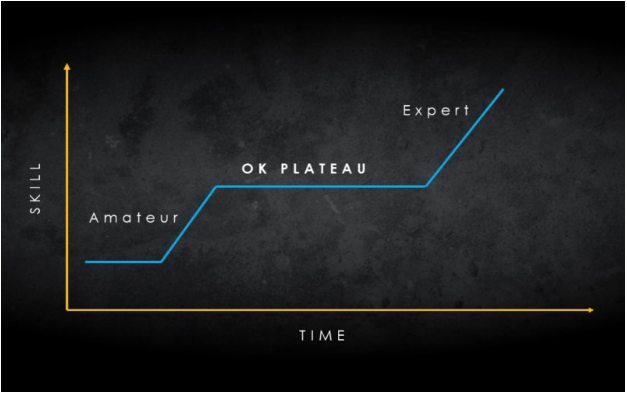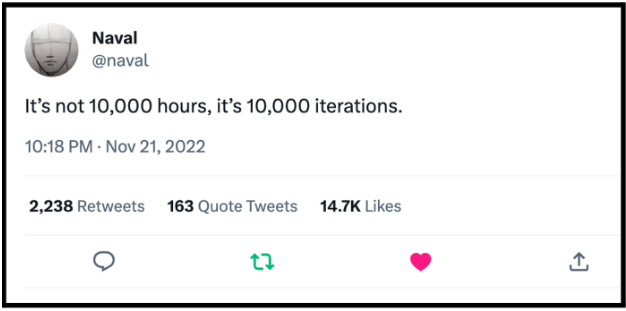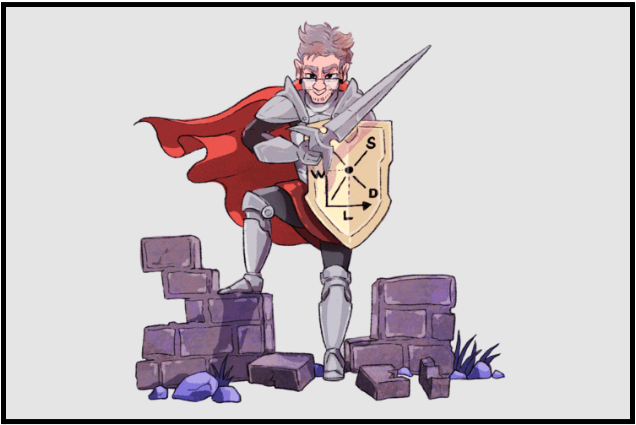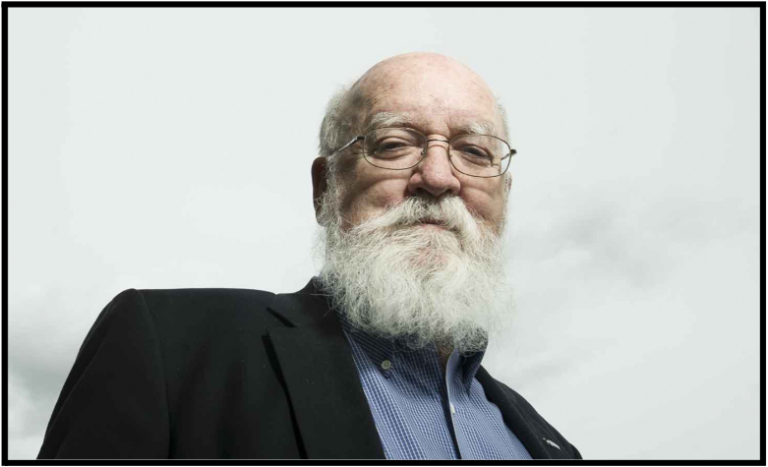He says that success comes from putting in ten times the effort. He’s right – with a crucial caveat.
Talking Big Ideas.
“Cook every single day. Taste everything thoughtfully.”
~ Samin Nosrat, Salt, Fat, Acid, Heat: Mastering the Elements of Good Cooking
One of my favorite Substacks is Bryan Caplan’s Bet on It. He argues in a recent post that success comes from putting in more effort. Ten times more, to be specific:
When I see the contrast between people who succeed and fail, I generally witness a . . . gap in effort. During my eight years in college, I spent many thousands of hours reading about economics, politics, and philosophy. Since high school, I’ve spent over ten thousand hours writing. When young people ask me, “How can I be like you?“ my first thought is . . . do ten times as much.
How do you get ahead in your career? Improve your marriage? Become an excellent public speaker? Caplan says the answer is simple yet challenging: “multiply your effort by a factor of ten.”
WHAT CAPLAN GETS RIGHT
He succinctly states the essence of Anders Ericsson’s life work. Ericsson was among history’s leading experts on human achievement, spending decades studying champions in sports, memory, music, games, and more.
In the 1990s, Ericsson studied violinists at the prestigious Berlin University of the Arts. Working with the instructors, he privately categorized the students into three skill levels: good, better, and best.
What factors determined which group the students ended up in? The research found that, surprisingly, just one metric made the difference. And it wasn’t innate talent.
It was time.
The “best” students on average spent about 2,000 more total hours practicing than the “better” students. And the “better” students spent about 2,000 more hours practicing than the “good” students.
Ericsson wrote: “We found no shortcuts and no prodigies . . . the violinists who had spent significantly more hours practicing their craft were on average more accomplished.”
Ericsson’s team also researched the most successful professional violinists alive — the current international soloists. They spent the same amount of time practicing throughout their formative years as the students in the “best” group.
This study has been replicated across numerous disciplines. The secret ingredient to elite performance holds: Time.
But what about Mozart? Wasn’t he born a musical genius? No, he became one by practicing all day. Starting at four years old.
Tom Brady? 16 hours of practice a day.
Magnus Carlsen, the greatest chess player alive? He says it best: “It’s been about putting in the time, obviously.”
CAPLAN’S INSIGHT APPLIED TO SPEAKING
I work with professionals from diverse backgrounds. And wildly different baselines. I help them to transform their public speaking skills. Some are already super talented and others start from scratch. Some love the limelight and others are terrified by it.
But one principle always holds true: Those who practice the most make the most progress.
During the pandemic, I worked with a group of ten spokespeople at the Mercatus Center at George Mason University. As the cohort came to an end, we held a final event. Each speaker delivered their best speech. Everyone voted on their favorite.
Two speakers won all the votes: Weifeng and JZ. And it was a tie!
Before the event ended, the training director at Mercatus announced how much time each participant put into individualized practice sessions with her. She wanted to reward the spokesperson who practiced the most.
As it turned out, this too was a tie – between the winners: Weifeng and JZ.
Practice matters.
WHAT CAPLAN LEFT OUT
Ericsson’s research also shows that how we practice is critical to our success. “Just doing it” isn’t enough. For example, you and I have both logged countless hours typing, driving, talking, walking, etc. But we don’t continue to see gains simply by virtue of investing our time.
Instead, we hit the Ok Plateau and stagnate:

To make progress on skill development, we must spend our time in a specific way. Ericsson calls it deliberate practice. And it involves focusing our full attention and rigorously iterating based on feedback.
The iterating part is often ignored – yet it’s the crucial ingredient to success.
The iterating part is often ignored – yet it’s a crucial ingredient to success.
A writer could spend a decade passionately pouring words onto the page. But if they don’t get feedback from readers along the way, accept critiques from their editors, and engage in multiple drafts, their work will likely be a failure. This is the same reason cookbooks drive home the importance of taste tests.
The philosopher Karl Popper famously taught that good scientists seek out criticism and are eager to change their minds based on new evidence. It’s the same reason every professional athlete “watches the tape” and has several coaches: Professionals who want to grow look for ways to iterate.

Josh Trank, the director of the 2015 movie Fantastic Four, worked extremely hard on his film. But it was a box office bomb with a 9% Rotten Tomatoes score because of his inability to embrace feedback throughout the production process and make adjustments.
Ford Motor Company made a huge investment of time, effort, and money in the Edsel. But management famously ignored market feedback. The Edsel became one of the most notorious failures in automotive history.
There are countless examples of hardworking entrepreneurs who failed because they didn’t adjust their products based on feedback. All the effort in the world may be meaningless without it.

Iteration is essential for progress in our universe.
It’s how biology forms complex life. How markets create wealth. How science and ideas advance. And how we build new technologies – and skills.
As the neuroscientist Ethan Kross says, iteration based on reflection and feedback is “one of the central evolutionary advances that distinguish human beings from other species.”
While Caplan fails to mention anything about iterating, he does say you should 10x your effort on whatever “you already think the crucial ingredient is.”
10x your iterations.
###





